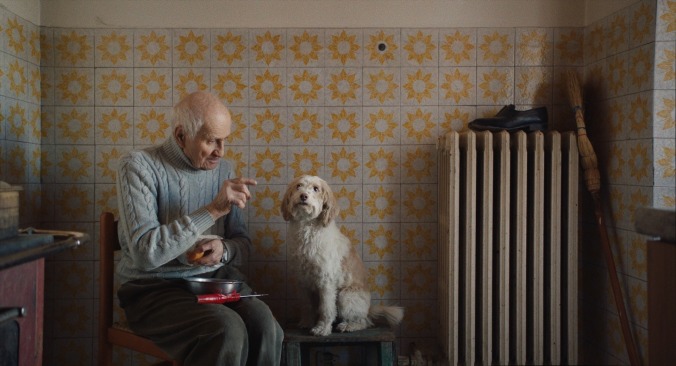The Truffle Hunters is a rare treat for gourmets and dog lovers alike


Note: The writer of this review watched The Truffle Hunters on a digital screener from home. Before making the decision to see it—or any other film—in a movie theater, please consider the health risks involved. Here’s an interview on the matter with scientific experts.
Oh, to be a dog romping through the hills of Northern Italy in autumn. The clouds are swollen and gray, and the grass is damp and green, and the smell that wafts up as the rain mixes with the chemicals in the earth has to be overwhelming. Oh, the odors: of wet dirt, of dead leaves, of birds in the trees and rabbits in the bushes, of the wool sweater on the old man who hand-feeds you chunks of meat every night. You take off, furry little feet barely touching the ground as you run toward the deepest, dankest scent in the entire forest, the one you have to dig to really inhale. Some dogs get in trouble for ripping up the ground and getting their paws all muddy, but not you. The old man smiles and pats you on the head. You’ll have steak tonight.
Based on title alone, The Truffle Hunters sounds like a food documentary. And, to some degree, it is. In the same sense that Jiro Dreams Of Sushi finds spiritual clarity in precise cuts of high-quality tuna, The Truffle Hunters takes a rare and exotic delicacy—the Alba white truffle—and turns it into an elegy for a simpler, pre-technological way of life. White truffles cannot be cultivated, take five years to grow in the wild, and can only be harvested for a few months out of the year in the Piedmont region of Italy. Foraging techniques are passed down by word of mouth, as are the secrets of training truffle dogs, and the best spots are closely guarded family heirlooms. It seems like this picturesque little corner of the world is the last place where quality and tradition are more important than money. Early on in the film, a competitor asks to buy a veteran hunter’s best dog, to which he replies, “Will you sell me your child?”
But even this shabby little Eden is not safe from cutthroat global capitalism. Seeing the outrageous prices white truffles can fetch on the international market, outsiders have begun to encroach on local hunters’ territory, snatching up all the truffles and poisoning their dogs. The loss of income these men can withstand, but the assault on their canines fills them with rage: “Dogs are innocent,” one mutters angrily as he bangs out a screed on his ancient typewriter. Combined with scenes of a local broker surreptitiously pulling out handkerchiefs full of truffles to show slavering chefs in a literal back alley, one gets the impression that dark clouds are forming on the horizon. It’s the closest this film gets to deconstructing the truffle business and the environmental devastation that has pushed both the fungi and the people who make their living finding them to the brink of extinction.
Mostly, directors Michael Dweck and Gregory Kershaw film their subjects in a manner that suggests the stateliness of a Renaissance painting and the whimsy of a Wes Anderson movie. The truffle hunters of the title are all in their 70s or older. One looks like the original keyboard player for a prog-rock band; another, a wine-drunk wizard. Their rustic surroundings and eccentric lifestyles—speaking in soothing tones, lifelong bachelor Aurelio tells his beloved dog Birba that he doesn’t need a wife because he has her—make them compelling vessels for the film’s subtly anti-capitalist, pro-sustainability message. But the real stars of the documentary are their dogs, who get their own title card in the end credits and feature in the film’s quirkiest technical achievement: a sequence filmed with a GoPro that shows the hunt from the dogs’ point of view.
All these cute stylistic touches could lead one to argue that the film patronizes its subjects, reducing them to ineffective mascots of a lost cause. And Dweck and Kershaw do put aesthetics first in The Truffle Hunters, which is composed of vignettes capturing the daily lives of the hunters and middlemen as they argue, negotiate, hike, dig, eat, sleep, push their ancient cars out of mud pits, sing along to accordion music next to crumbling medieval farmhouses, and argue some more. This is a portrait of a subculture, not an advocacy documentary. But in a world where more is never enough, an ode to—as one of the film’s subjects puts it—“hav[ing] fun, play[ing] with dogs, and enjoy[ing] nature” is, in its own modest way, a political statement.
It’s not until the end of The Truffle Hunters that we see anyone actually ingest a truffle, as a dealer eats, slowly and with great pleasure, a fried egg generously showered with shavings as opera music plays softly in the background. The intense reverence with which he smells, chews, and swallows wordlessly conveys the specialness of the experience, and indeed why it’s worth preserving. Ironically, this charming and visually ravishing film may further fuel the demand for white truffles, inflating the bubble and ultimately accelerating their decline. On one level, that’s understandable; we all want to be part of something rare and beautiful. But if you truly heed what the film has to say, you’ll go to the park and play with your dog instead.